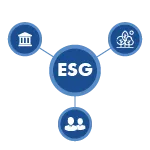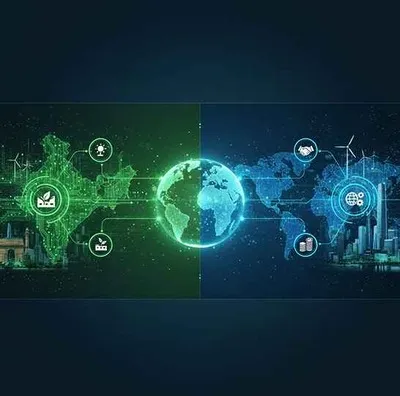Sustainability goes beyond environmental protection; it is about building resilient economies, inclusive societies, and a healthier planet. It connects environmental, social, and governance (ESG) practices with innovation in renewable energy, resource efficiency, and nature-based solutions.
The UN Sustainable Development Goals (SDGs), a set of 17 global objectives, form the blueprint for addressing climate change, ending poverty, promoting equity, and ensuring responsible consumption and production.Today, sustainability is not just a moral imperative; it’s also a strategic business necessity. Governments, investors, and consumers are demanding action, reshaping how industries operate.


Exploring the Six pillars of Sustainability
Sustainability is not a single action but a systemic transformation, covering food systems, energy, resource use, and climate action. From the 17 Sustainable Development Goals (SDGs) to ESG reporting, businesses, policymakers, and individuals are rethinking how we produce, consume, and innovate. Below are the key pillars that drive sustainable development and future-ready strategies.
Organic farming | Biodegradable materials | Healthy soils
Agriculture lies at the heart of environmental sustainability. Transitioning to organic farming enhances soil health, biodiversity, and food safety. Biodegradable materials derived from agri-waste are replacing plastics in packaging, textiles, and consumer goods. These innovations follow Life Cycle Assessment (LCA) principles to minimize environmental impact across a product’s journey—from farm to finish.
.jpg)
Reduce | Reuse | Recycle | Redesign
The traditional “take–make–dispose” model is evolving into a circular economy that emphasizes resource conservation and value regeneration. Circular systems enable sustainable business models, cut emissions, and reduce waste. This pillar also supports sustainability reporting, business model innovation, and the integration of “digital sustainability tools” for modern enterprises.
.jpg)
Plastics | E-waste | Construction waste
Recycling innovation drives efficient resource use and corporate accountability. India’s Extended Producer Responsibility (EPR) policy mandates companies to manage end-of-life waste responsibly. Leaders investing in “corporate sustainability strategy” and “ESG integration training” are aligning operations with standards like GRI, SASB, CSRD, and India’s BRSR, ensuring measurable, transparent impact.
.jpg)
Solar | Wind | Hydrogen | Storage
The energy transition depends on renewable technologies and decarbonization strategies. Solar, wind, hydrogen, and storage systems are revolutionizing how we power industries. Programs like “green hydrogen investment” and “renewable energy leadership” prepare professionals for net-zero roles. Clean energy and green finance are now core to strategic thinking for carbon-neutral economies.
.jpg)
Mangroves | Regenerative farming | Afforestation
Nature-based solutions (NbS) restore ecosystems and mitigate climate risks. From mangrove restoration to regenerative agriculture, NbS enhance carbon capture, reduce floods, and boost soil resilience. Corporate and policy leaders are integrating NbS into “climate finance and investment” frameworks, ensuring economic and ecological balance through science-led sustainability strategies.
%20(1).jpg)
Direct air capture | Biochar | Soil carbon
Carbon Dioxide Removal (CDR) complements emission reduction by capturing atmospheric CO₂ through direct air capture, biochar, and soil sequestration. While challenges remain in scalability and cost, CDR forms a key pillar in achieving net-zero. Professionals upskilling in “carbon markets”, “climate finance”, and “carbon trading strategies” are shaping tomorrow’s decarbonized world.
.jpg)
To thrive in the era of climate action and sustainable development, professionals must acquire interdisciplinary expertise that cuts across science, policy, technology, and finance. These are the core skills shaping the sustainability and ESG workforce globally:
.webp)
Sustainability has rapidly transformed from a niche discipline into a mainstream career pathway. With governments, investors, and businesses committing to climate action, ESG reporting, circular economy adoption, and carbon neutrality, the demand for skilled professionals is rising across every industry.
Energy, finance, FMCG, IT, automotive, and real estate are embedding sustainability, ESG, and green finance into their core strategies. Companies like Microsoft, Unilever, BlackRock, and Tata Group are leading the charge.

Regulatory frameworks such as India’s BRSR, the EU’s CSRD, and global disclosure norms (GRI, SASB, TCFD) are driving mandatory sustainability reporting. This has created a surge in demand for ESG reporting, disclosure, and compliance experts.

Sustainability professionals now work in carbon markets, green finance, cleantech, renewable energy, ESG consulting, policy advisory, and sustainable urban development. Career opportunities span India, EU, US, and APAC with mobility across sectors.

Studies indicate salary hikes of 30–50% for sustainability professionals, particularly in ESG leadership, carbon finance, and renewable energy management. Roles such as ESG Analysts, Sustainability Consultants, Net Zero Strategists, and Climate Risk Managers are commanding premium pay.

India: Strong push from SEBI’s ESG compliance, renewable energy missions, and corporate BRSR reporting.
EU: Leaders in sustainable finance, circular economy, and carbon markets due to Green Deal mandates.
US: Expansion in climate finance, decarbonization technologies, and corporate sustainability strategy.
APAC: Rapid adoption of green hydrogen investments, energy transition programs, and carbon trading schemes.

Companies are seeking expertise in life cycle assessment, sustainable supply chains, carbon neutrality, cleantech innovation, green investment skills, and strategic thinking for net zero. Professionals equipped with these skills will be positioned as future leaders in sustainability and ESG.

For corporate sustainability leaders, sustainability is no longer a side-reporting function — it is core to corporate strategy, risk management, and global competitiveness. Career pathways here focus on board-level influence, transformation mandates, and multi-stakeholder leadership. Following are Typical Career Pathways & Roles:
Executive leaders integrating Net Zero and ESG across business units.
Embedding sustainability into corporate purpose and culture.
Managing board-level risk frameworks (TCFD, CDP, BRSR) and aligning with investor expectations.
Entry-Level Pathway: Sustainability Analyst / CSR Executive → Supporting sustainability data tracking, ESG goal reporting, and internal initiatives.
Driving ESG compliance, investor engagement, and climate-linked financial disclosures (BRSR, TCFD, CSRD).
Ensuring compliance with GHG Protocols, ISO standards, and global sustainability frameworks.
Leading climate reporting, assurance, and performance benchmarking.
Entry-Level Pathway: ESG Analyst / Sustainability Research Associate → Supporting consulting teams with data analysis, benchmarking, and client reporting.
Implementing Scope 3 emission reduction, supplier decarbonization, and ethical sourcing.
Overseeing industrial electrification, renewable integration, and carbon footprint reduction.
Driving efficiency and low-carbon transformation across plants and facilities.
Entry-Level Pathway: Energy Analyst / Sustainability Engineer → Working on carbon accounting, renewable deployment, and life-cycle assessments.
Structuring sustainability-linked loans, bonds, and green investment portfolios.
Integrating ESG metrics into financial reporting and investment risk management.
Evaluating the environmental and social outcomes of financial projects.
Entry-Level Pathway: ESG Research Analyst / Climate Finance Associate → Supporting financial modeling, sustainability-linked reporting, and impact assessment.
Designing and implementing climate adaptation, carbon markets, and Net Zero policies.
Interpreting ESG and sustainability regulations for industry and government collaboration.
Climate & Development → Overseeing sustainability initiatives within public or international organizations.
Entry-Level Pathway: Policy Researcher / Project Associate → Supporting sustainability think tanks, NGOs, or government programs.
Leading change management, sustainability integration, and capability building across departments.
Aligning business strategy with ESG and Net Zero objectives across teams.
Embedding climate literacy and sustainable practices across the workforce.
Entry-Level Pathway: Sustainability Coordinator / Program Assistant → Facilitating inter-departmental sustainability projects and awareness campaigns.
These programs are designed for senior-level professionals and decision-makers responsible for steering corporate sustainability and Net Zero strategies. If you are:






If you are a corporate leader asking, “How do I take my company from sustainability ambition to measurable, investor-ready action?”, then our PG Executive Program in Net Zero & Sustainability Leadership is built for you.

“Best Sustainability Courses to Build Your Career”